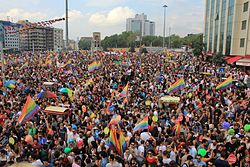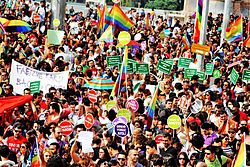Istanbul Pride
 From Wikipedia - Reading time: 11 min
From Wikipedia - Reading time: 11 min



Istanbul Pride (Turkish: İstanbul Onur Yürüyüşü) is a pride parade and LGBTQ demonstration held annually in Turkey's biggest city, Istanbul since 2003. Participants assemble in Taksim Square before marching the entire length of İstiklal Avenue. It has been described as the first and biggest LGBT event in Muslim-majority countries.
The event reached roughly 5,000 people by 2010. In 2013, the pride parade, with the attendance of Gezi Park protesters attracted almost 100,000 people.[1][2] The 2014 Pride was the biggest LGBT event in Turkey's history and attracted more than 100,000 people.[3]
Since 2015 pride parades in Istanbul were denied permission by the Governorship of Istanbul authorities. The governors repeatedly stated that the denials were based on security concerns and public order, but critics claimed the bans were taken on a religious and ideological basis. Despite the refusal, hundreds of people defied the ban each year, which resulted in law enforcement intervention.[4]
Politicians that have joined Istanbul Pride are mainly from the opposition parties Republican People's Party (CHP), Peoples' Democratic Party (HDP) and Worker's Party of Turkey (TİP).
History
[edit]
The event first took place in 2003 and now occurs each year on either the last Sunday of June or the first Sunday of July, to mark the end of Istanbul pride week. About 30 people took part in the first Gay Pride Istanbul. The numbers have increased exponentially each year, reaching roughly 5,000 people by 2010. The 2011 gathering attracted over 10,000 people, therefore making Gay Pride Istanbul the biggest march of its kind in the Muslim majority countries.[5][6][7][8] The 2012 pride march, which took place on 1 July, attracted between 10,000 and 30,000 people.[9][10]

On 30 June 2013, the pride parade attracted almost 100,000 people.[1] The protesters were joined by Gezi Park protesters, making the 2013 Istanbul Pride the biggest pride ever held in Turkey.[2] The 2014 pride attracted more than 100,000 people.[3] The European Union praised Turkey that the parade went ahead without disruption.[11]
Suppression since 2015
[edit]On Sunday 29 June 2015, Reuters reported that Turkish police used a water cannon to disperse the gay pride parade.[12] In 2016 the pride march was banned by the local government "for the safety of our citizens, first and foremost the participants’, and for public order."[13] LGBT organizations have also not been allowed to make a press statement. The governate of Istanbul once again claimed that a gathering of LGBT would not be allowed. "Within Law No: 5442, this request has not been approved due to the terror attacks that have taken place in our country and the area; because provocative acts and events may take place when the sensitivities that have emerged in society are taken into account; and because it may cause a disruption in public order and the people's- including the participants of the event- tranquility, security, and welfare.".[14] Supporters of the Pride claimed this decision was religiously motivated and the event was banned because it would have take during the Muslim holy month of Ramadan.[12]
In 2017 the Istanbul Governor's Office yet again banned the LGBT Pride Parade, citing security concerns and public order.[15]
In 2018, for the fourth consecutive year the Istanbul Governor's Office yet again banned the LGBT Pride Parade, citing security concerns and public order, but around 1,000 people defied the ban, they were met with tear gas and rubber bullets. 11 participants were arrested.[16][17]
In 2019, the Istanbul Governor's Office yet again banned the LGBT Pride Parade, citing security concerns and public order.[18] subsequently, opposition Member of the Grand National Assembly Sezgin Tanrıkulu of the Republican People's Party (CHP) lodged a parliamentary question to the Vice President of Turkey Fuat Oktay asking why the deputy governor of Istanbul had banned Istanbul Pride. He also asked how many LGBT members had been killed in the last 17 years, the time the ruling party Justice and Development Party (AKP) ruled the city, due to provocative hate speech, and raised concerns over discrimination against the LGBT community.[19][20] On 29 June, hundreds of people defied the ban, they were met with tear gas, shields, pepper gas and plastic bullets from the Police.[4][21]
Due to the COVID-19 pandemic, Istanbul Pride was held online in 2020. Some activists gathered in person at Mis Sokak, which had been the finale of the 2003 parade.[22]
The trend of suppression has continued. Blockades and tear gas were used in 2021 and 25 people were arrested.[23] in 2022, 373 were arrested. In addition to blockades, public transportation to Taksim square was shut down.[24] Starting with 2023, and again in 2024, Istanbul Pride was held in non-Taksim square public spaces, and fake meeting calls were announced prior to thwart law enforcement. Despite these efforts, 2023 had 113 arrests, while 2024 had 11 arrests, three of whom were minors. [25][26]
Political impact
[edit]Politicians that have joined Istanbul Pride are mainly from the opposition parties HDP, CHP, TİP and include:
They call upon the Turkish authorities to guarantee fundamental rights and civil liberties to all LGBT people.
In 2019, several opposition held municipalities have shown support to the LGBTI community on social media. Mersin, Edirne, Tarsus, Eskişehir, İzmir, Bodrum. Istanbul's local governments such as Ataşehir, Beşiktaş, Şişli, Kadıköy, Maltepe, Kartal also showed their sympathy.[27]
In 2019, shortly after the 2019 Turkish local elections opposition politician and Mayor of Istanbul Ekrem İmamoğlu stated that the ban cannot be reversed as the right to give permission to demonstrations lies with the governorship and the governors of Turkish provinces are not elected but directly appointed by the presidency.[28]
See also
[edit]- LGBT culture in Istanbul
- LGBT rights in Turkey
- Bigudi Club, lesbian and queer nightclub and bar in Istanbul
References
[edit]- ^ a b "Gay Pride in Istanbul groot succes - TV | Altijd op de hoogte van het laatste nieuws met Telegraaf.nl [tv]". Telegraaf.nl. Archived from the original on 2017-07-28. Retrieved 2013-11-02.
- ^ a b "Taksim'deki Onur Yürüyüşü'ne BBC yorumu: Bugüne kadar... - Milliyet Haber". Dunya.milliyet.com.tr. Archived from the original on 2013-11-04. Retrieved 2013-11-02.
- ^ a b "100.000 KİŞİ! DİLE KOLAY!". POPKEDİ. Archived from the original on 2016-03-04. Retrieved 2014-10-25.
- ^ a b "17TH İSTANBUL LGBTI+ PRIDE PARADE: Police Attack with Shields, Pepper Gas After Pride Parade Statement Read". Bianet - Bagimsiz Iletisim Agi.
- ^ Tahaoğlu, Çicek (27 June 2011). "19. LGBTT Onur Haftası, Onur Yürüyüşü ile Sona Erdi". KAOS GL. Archived from the original on 1 July 2011. Retrieved 29 June 2011.
- ^ "Stonewall'dan Bugüne". KAOS GL. 24 June 2011. Archived from the original on 1 July 2011. Retrieved 29 June 2011.
- ^ "Homosexuals demand rights at Istanbul's Gay Pride March". Hürriyet Daily News. 27 June 2011. Retrieved 29 June 2011.
- ^ "İstiklal Caddesi 10 bin renk! - Genel". ntvmsnbc.com. Retrieved 2012-09-26.
- ^ "EUROPRIDE BID FOR 2015, ISTANBUL". Facebook. 2012-07-04. Retrieved 2012-09-26.
- ^ "Gay Pride İstanbul - 01.07.2012". YouTube. 2012-07-01. Retrieved 2012-09-26.
- ^ "Turkey 2013" (PDF). Archived from the original (PDF) on 2013-11-15. Retrieved 2013-12-05.
- ^ a b "Turkish police use water cannon to disperse gay pride parade - by Mehmet, Caliskan and Yesmin Dikmen". in.reuters.com. 28 June 2015. Archived from the original on March 7, 2016. Retrieved 2015-06-28.
- ^ "T.C. İstanbul Valiliği | BASIN DUYURUSU". Archived from the original on 2018-12-14. Retrieved 2016-08-11.
- ^ "Sayfa Bulunamadı". Kaos GL.
- ^ "Governor's Office bans LGBT Pride March in Istanbul". hurriyet.
- ^ "Eleven arrested at Istanbul Pride as march goes ahead despite official ban". The Independent. July 2, 2018.
- ^ Sheena McKenzie (2 July 2018). "Istanbul pride: Hundreds of LGBTI+ campaigners defy ban". CNN.
- ^ "Authorities block Pride March in second Istanbul location". Ahval. Archived from the original on 2021-09-12. Retrieved 2019-06-26.
- ^ "CHP MP SEZGİN TANRIKULU: 'On What Grounds is Pride Parade not Permitted?'". Bianet - Bagimsiz Iletisim Agi.
- ^ "Turkish opposition deputy questions gov't over banning pride marches". June 25, 2019.
- ^ "Istanbul police use tear gas to disperse gay pride march | DW | 30.06.2019". DW.
- ^ "A Step-by-Step Account of the Istanbul Pride: A Rebellion' Brief History". Heinrich-Böll-Stiftung Istanbul. 21 June 2022.
- ^ "Istanbul: Authorities fire tear gas, make arrests at Pride march". DW. 26 June 2021.
- ^ "Turkish police detain 373 LGBTI pride protestors in Istanbul". Duvar English. 27 June 2022.
- ^ "Türkiye: Onur Yürüyüşlerine Kitlesel Gözaltı | Human Rights Watch" (in Turkish). 2023-06-27. Retrieved 2025-01-25.
- ^ "22. İstanbul Onur Yürüyüşü Gözlem Raporu". TİHV - Türkiye İnsan Hakları Vakfı (in Turkish). Retrieved 2025-01-25.
- ^ "Tweet". twitter.com. Retrieved 2021-03-21.
- ^ Sade, Gizem (2019-06-28). "İmamoğlu: Onur Yürüyüşü yasağının İBB ile ilgisi yok ama konuşacağız". euronews (in Turkish). Retrieved 2022-01-27.
External links
[edit]- PrideIstanbul.org Archived 2017-12-27 at the Wayback Machine
 KSF
KSF